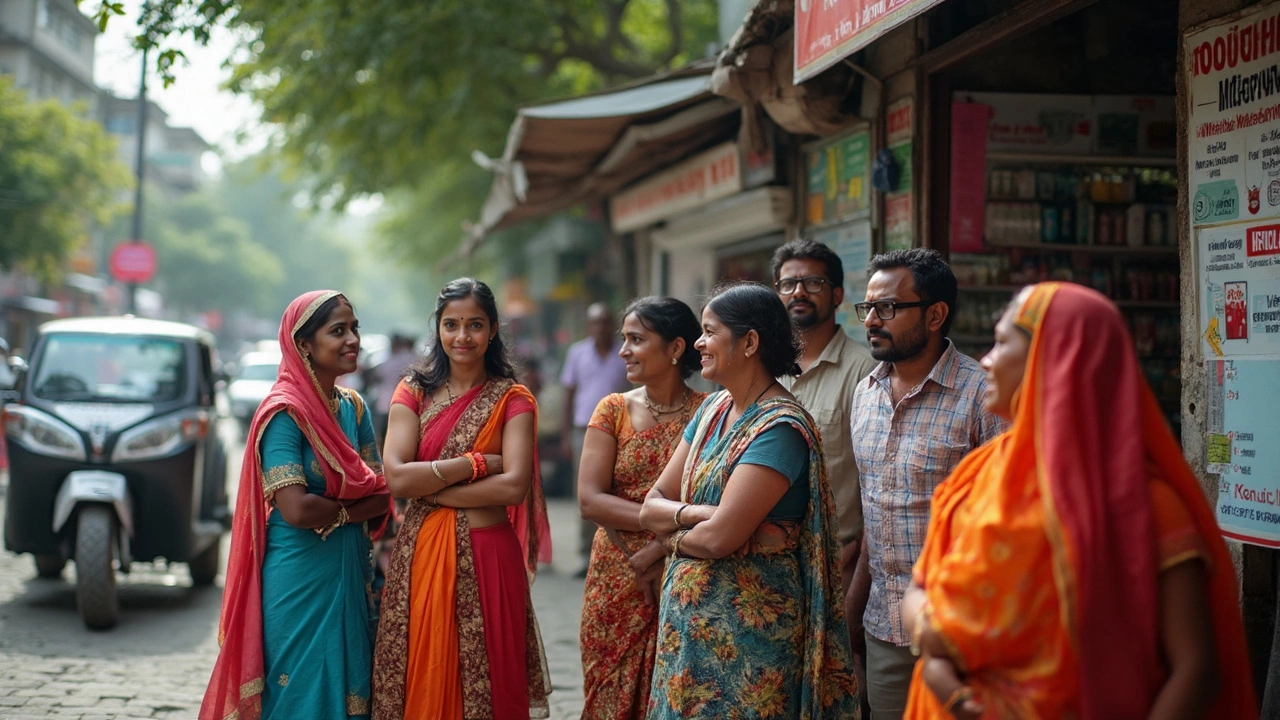Imagine a medicine that could help you lose weight, but it costs more than a fancy smartphone every month. That's pretty much the situation with Wegovy. Social media, fitness forums, and even WhatsApp groups in Bangalore are buzzing with stories about this shot making serious waves in weight loss. People want it. But then comes the big question: Will your insurance actually pay for Wegovy? Or will you keep refreshing your banking app with a sinking feeling every month?
Wegovy: What Is It and Why Are People Obsessed?
If you haven't heard of Wegovy yet, you either live under a rock, or you're lucky enough not to be hunting for a way to shed kilos. Wegovy is the brand name for semaglutide, a drug that was originally made for type 2 diabetes. But then researchers noticed something wild: people were not only seeing their blood sugar levels drop, but those numbers on the weighing scale started to tumble too. In fact, a study published in 2023 in the New England Journal of Medicine found that people using semaglutide lost about 15% of their body weight on average over a year. That's not your run-of-the-mill diet pill promise—this is actual science.
Why is everyone suddenly interested? Partly because of celeb buzz. Elon Musk tweeted about it, American talk shows started name-dropping it, and next thing you know, local Bengaluru execs are asking their doctors about "that fat-loss injection." It works by mimicking a gut hormone called GLP-1, which tells your brain "enough, stop eating." Less hunger, less eating, steady weight loss. For folks with obesity or tricky metabolic issues, that's huge.
But there's a catch. Wegovy's cost is eye-watering. While it's FDA-approved for chronic weight management in the US, in India, the availability as "Wegovy" is limited as of mid-2025. Some diabetics do get the same ingredient under the brand Ozempic, but Wegovy's doses for weight loss are higher. As of this article, a monthly supply in the US can set you back USD $1300 (about ₹1.1 lakh), and in Europe, it hovers around €300-€400. In India, when sourced off-label, prices vary wildly based on supply chain and pharmacy markup—but even if you get it, you'll feel that hit in your bank account.
How Insurance Companies View Wegovy—and the Fine Print
Here's where things get interesting—and a bit frustrating. Traditionally, health insurers weren't too keen on covering weight-loss drugs. Many saw obesity as a "lifestyle problem" rather than a medical condition. Indian insurance plans (think Star Health, Niva Bupa, HDFC Ergo) would happily cover diabetes meds or surgeries after a diagnosis, but for weight loss? Not so much.
Globally, the landscape started moving. In the US, due to intense lobbying and a growing understanding of obesity's medical complications, several employer health plans now cover Wegovy for people meeting strict requirements (usually a BMI of 30+ or 27+ with comorbidities like hypertension or diabetes). Still, Medicare won't touch it. In the UK, the NHS green-lit Wegovy for prescription in 2023 for certain patients in specialist clinics—but that roll-out is tightly controlled and not everyone qualifies. In Germany and Canada, similar patterns: Access is growing but far from universal.
What about India? As of June 2025, there is no mandated insurance coverage for Wegovy for weight loss. No insurer advertises it as a covered benefit. Most policies exclude "cosmetic" treatments or "weight-reduction medications." There are rare exceptions: Sometimes, if obesity is linked to a documented medical condition and a doctor pushes hard enough, you might get some coverage under the chronic illness section—but this is the exception, not the rule. Proving necessity, getting documentation, and negotiating with the claims department demands the patience of a zen monk and stamina of a marathoner.
| Country | Coverage Status (2025) | Typical Cost (INR equivalent) |
|---|---|---|
| United States | Partial (employer plans only) | ~1,10,000/month |
| United Kingdom | Yes (strict NHS criteria) | ~40,000-60,000/month |
| Germany | Partial (case-by-case) | ~35,000-60,000/month |
| India | No (except rare exceptions, off-label only) | ~20,000-75,000/month |

When Might Insurance Pay (Rare, But Not Impossible!)
If you've come this far, you're probably feeling a bit let down. Good news: Not all hope is lost. Here are some lesser-known routes where you might just score insurance support—though you'll need to be savvy, persistent, and maybe a bit lucky:
- Chronic Disease Coverage: Some high-end policies (usually international coverage or premium employer-provided policies) will cover obesity medications as long as they're directly prescribed for a life-threatening or chronic disease like diabetes, PCOS, or cardiovascular risk. But your doctor and you will need to connect the dots convincingly.
- Hospitalization & Surgery Prep: In rare cases, if a doctor prescribes Wegovy before a surgery (like bariatric surgery or a planned orthopedic procedure) and documents it as "medically necessary pre-operative treatment," part of the medicine cost may be reimbursed under pre-surgery expenses.
- The Appeal Route: If a claim gets rejected, don't just accept it. You have a right to appeal. Get your doctor to provide a detailed report on why obesity is causing or worsening another medical issue. Sometimes, persistent follow-ups and documentation nudge insurers into paying, at least partially.
- Corporate Wellness Benefits: Some large multinationals with global insurance plans have started piloting weight-management programs. Check if your policy (especially if you work for a US-based MNC) includes "pharmacy benefit management" or wellness coverage.
Bottom line: Don't assume a no is a final answer. Push, ask questions, and use every legal (and ethical) argument you can. There have been cases where people in India, after three or four rejections, finally wore down their insurer and got a little back!
Tips to Make Wegovy More Affordable (With or Without Insurance)
Let's face it: Not everyone can spend several thousand rupees each month indefinitely. If your insurance says a hard no, or you just want to bring down your costs, here are tactics that have actually worked for people—not magic, just practical moves:
- Compare Pharmacies: Hop between larger chains (like Apollo Pharmacy, MedPlus, or even digital portals like Tata 1mg) for the best price. Some local chemists in big cities offer better deals than corporates, especially if you build a relationship.
- Go for Alternatives: In India, semaglutide is available in "Ozempic" and sometimes "Rybelsus" (the oral form, though less effective for weight loss). If your doctor allows, and your goal is more moderate weight loss, these might be cheaper and sometimes easier to get.
- Check for Samples or Starter Packs: Doctors sometimes have access to starter kits or free samples (especially in corporate hospitals). It never hurts to ask, especially if you have a long-term relationship with your endocrinologist.
- Patient Assistance Programmes: Novo Nordisk, the manufacturer, runs periodic pilot schemes or cost-reduction programs in some cities. Keep your ears open for announcements; it can mean short-term savings and lets you "test drive" the drug.
- Bulk-Buy with Caution: Occasionally, buying a three- or six-month supply earns you a big discount. However, be strategic about this—medications degrade, and storage is a pain (Wegovy needs refrigeration!). Also, only buy from legitimate, traceable sources. Counterfeit risk is real in India.
- Consider Off-label via Physician: Some diabetologists quietly prescribe higher doses of semaglutide (as Ozempic, which insurers might cover for diabetes). But ethics and safety should top your list—never self-adjust doses.
And if you don't qualify for Wegovy, don't give up on your weight-loss goals! Newer drugs and programs are constantly popping up. The public conversation around obesity as a medical, not moral, issue is finally moving the needle in India. In five years, insurance plans may look totally different.

What to Watch for in 2025 (And Beyond)
The world of weight loss and insurance is shifting faster than Bangalore's infamous weather. Just last year, several European countries began negotiating subsidies for new GLP-1 drugs. In the US, health advocacy groups are lobbying Congress to mandate coverage for weight-loss medications, and Indian pharma companies are already working on affordable biosimilar versions that could totally change the price game by 2026 or 2027.
If you're planning to start Wegovy or are already paying out of pocket, keep these things in mind:
- Track New Policies: Insurers revise their plans every April and September. Ask about new covers, exclusions, or disease-specific add-ons.
- Document Everything: Save all prescriptions, BMI reports, doctor's notes, and rejection letters. Insurers love paperwork!
- Stay Plugged-In: Join patient forums, WhatsApp groups, or Reddit threads. Users there often share tips about discounts or policy changes first.
- Talk to a Health Insurance Broker: Sometimes, the right broker knows of niche plans or corporate tie-ups that are not advertised. It's all about who you ask.
- Tread Carefully with Imported Stock: If you buy online from overseas, there are risks—customs seizure, dosage mismatch, and zero legal recourse if things go wrong. Stick to licensed sellers where possible.
One more thing: Even if insurance refuses to pay, more Indians are pushing back against "weight stigma" and demanding real medical support. Your persistence—the annoying follow-up calls, long chats with your doc, endless paperwork—might not just get you covered. It could nudge the system to finally treat obesity as the chronic illness that it really is.






